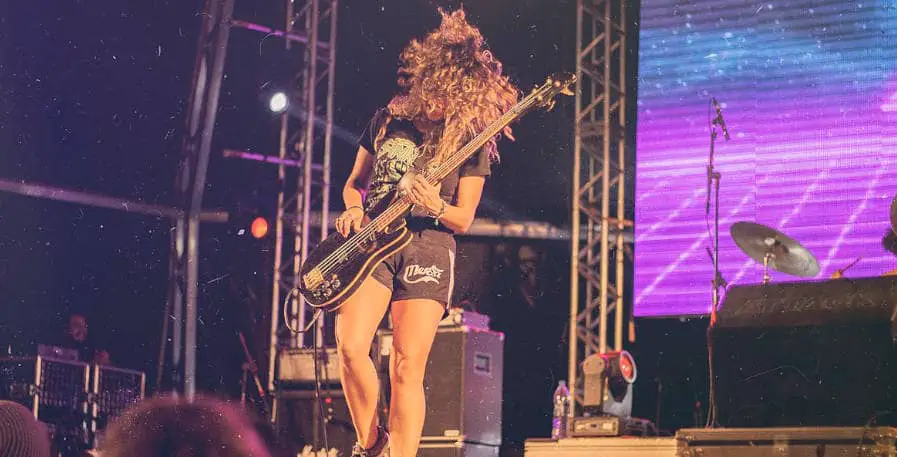As a bass player, it`s hard not to love the 1990s.
This was an amazing decade for music, and especially so for anyone who plays a 4 or 5-string.
While some bassists continued to build upon their 80s success, we also saw some newcomers rise to fame. Thus, to celebrate this great era of music, I decided to make a list of the best players from the 90s.
While narrowing it down was a hard task, I managed to get it down to 11. The list ended up being quite diverse, so hopefully you will discover some great 90s basslines you not have heard before.
So turn up your speakers or put on your favorite headset, here are my picks for the best bass players of the 90s.
11. Stuart Hamm
- Band: Session Musician
- Style: Fingers and Slapping
- Notable 90s songs: Time Machine (Joe Satriani), For The Love Of God (Steve Vai), Erotic Nightmares (Steve Vai)
Stu Hamn is a session bassist that has worked with many big names throughout his career.
In the 90s, the sound of his bass can be heard on some of the biggest instrumental rock hits of the decade. This is because he worked with two of the biggest names in the genre, Joe Satriani and Steve Vai on multiple occasions.
As a session musician, he was great at adapting his playstyle to different songs. What made him special though, is that he didn`t shy away from adding melody or playing pronounced slap lines. Thus, he always managed to serve the song, while making it sound special.
10. Robert DeLeo
- Band: Stone Temple Pilots
- Style: Fingers
- Notable 90s songs: Trippin’ On A Hole In A Paper Heart, Press Play, Meatplow
Stone Temple Pilots saw a quick and meteoric rise to fame after being formed in 1989.
During the 90s the band released 4 albums, the most notable among these being “Core” in 1992, and “Purple” in 1994. These included some of the band’s biggest hits, such as “Plush”, “Interstate Love Song”, and “Creep”.
The driving force behind these hits was Robert DeLeo`s groovy and loud basslines. He knew when to keep it simple, but also managed to always find the perfect spots to add melody to his lines.
On the studio recordings, his bass also sat incredibly well in the mix. Thus, he was not only one of the most successful bass players of the 90s. He also had a world-class understanding of bass tone.
9. Matt Freeman
- Band: Rancid, Operation Ivy,
- Style: Pick
- Notable 90s songs: Maxwell Murder, Roots Radicals, Time Bomb
Matt Freeman has written a ton of creative and fun punk basslines throughout his career.
His most known work of the decade can be heard on Rancid`s “… And Out Come The Wolves” album. This album was packed with hits, all of which had basslines that blended elements from different genres while still sounding punk.
Most notably, the album starts off with the song “Maxwell Murder”. On it, Freeman kicks the album off by showing that he is not your run-of-the-mill bass player with a bass solo. If anyone had any doubts, this solo showcased why Matt Freeman is one of the best punk bassists of all time.
8. Marcus Miller
- Band: Various Projects & Solo Career
- Style: Fingers and Slapping
- Notable 90s songs: Rush Over, Bang Bang (David Sanborn), Rikke (David Sanborn)
With a career that has spanned more than 40 years, Marcus Miller has proven countless times why he is one of the best bass players of all time.
During the 90s, he released 2 solo albums and played bass on countless other records. With David Sanborn alone, he played on 7 albums this decade. Thus, Miller`s groovy lines are a big part of what made “Bang Bang”, “This Masquerade” and “Rikke” become hits.
What`s most impressive about the man to me, is his versatility. Whether Miller wrote his own music or played with others, he was always able to adapt his style. This combined with the sheer amount of music he was part of during the 90s, makes him deserving of a spot on this list.
7. Justin Chancellor
- Band: Tool
- Style: Pick
- Notable 90s songs: Eulogy, Stinkfist, Forty Six & 2
Justin Chancellor joined Tool in 1995 and only played on one record with the band during the 90s. However, the impact he made on the metal world with his playstyle was massive.
On 1996`s “Ænima” the band had already developed an experimental, heavy, and progressive sound. They were also ambitious and unique. While many metal bands struggle to stand out, Tool managed to do just that and more. With that came a well-deserved and quick rise to success.
This can in large part be attributed to Justin Chancellors’ clever and distinctive way of playing the bass. Instead of avoiding the muddy sound of bass chords, he used them to add punch to his lines. He also always kept songs cohesive and groovy, despite Tool often switching time signature signatures mid-song.
Thus, none of Tool`s best basslines sound like any other basslines out there. With that, Justin Chancellor is not only of the most notable bassists of the 90s but also one of the most creative and unique.
6. Tim Commerford
- Band: Rage Against The Machine
- Style: Fingers and Slap
- Notable 90s songs: Killing In The Name, Bulls on Parade, Take The Power Back
Releasing 3 out of their 4 total albums during the decade, Rage Against the Machine were absolute hit machines in the 90s.
The band’s biggest hits “Killing In The Name”, “Bulls On Parade”, Guerilla Radio”, “Bombtrack” and “Testify” were all released this decade.
Tim Commerford’s metal jazz bass sound was integral to the sound of these tracks. He always knew when to double Tom Morello`s guitar, and when to deviate from it. This ensured that RATM tracks always sounded heavy, groovy, and unique.
Thus, Commerford played a major role in the success of the band, which made him one of the most influential bass players of the decade.
5. Stuart Zender
- Band: Jamiroquai
- Style: Slapping And Fingers
- Notable 90s songs: Cosmic Girl, Space Cowboy, When You Gonna Learn?
Despite only being a member of Jamiroquai from 1993 to 1998, Stuart Zender managed to pump out numerous great basslines while in the band.
The band released 3 albums during this time. With these came multiple major hits such as “Cosmic Girl”, and “Space Cowboy”.
Zender gravitated towards playing basslines that were melodic and funky. This made him pronounced in the mix and was a major part of what made it possible for Jamiroquai to reach the heights that they did.
On top of that, Zender always had an incredibly smooth tone, despite often adjusting it to fit the song. Put all of that together, and you have one of the funkiest bass players of the 90s.
4. Steve Harris
- Band: Iron Maiden
- Style: Fingers
- Notable 90s songs: Fear Of The Dark, Wasting Love, The Clansman
During the 90s, Iron Maiden was riding high on the success that they saw during the 80s.
While this decade was not as big for them as the last, it was still a major success for them. Much of this came from the band’s 1992 album “Fear Of The Dark”, where Steve Harris wrote the title track.
On it, he made the unusual choice of using the Dorian scale in a metal song for the intro. This made it anthemic and hopeful while also sounding sinister and dark. The result is an anthemic intro which in time helped turn this into one of the most iconic metal songs of all time.
As for bass playing, Harris stuck to playing galloping heavy metal on the P bass while being mixed loud on albums. This combined with his willingness to play leads and melodies made him stand out as a bass player. It also made him one of the most important metal bassists of the decade.
3. Flea
- Band: Red Hot Chili Peppers
- Style: Fingers, Slap, Pick (occasionally)
- Notable 90s songs: Give It Away, Around the World, Mellowship Slinky In B Minor
The Red Hot Chili Peppers had their biggest commercial success during the 2000s. However, this success was made possible by the strides and their rise to fame during the 90s.
RHCP released “Blood Sugar Sex Magik ” in 1991 and “One Hot Minute” in 1995. These albums featured some of Flea`s funkiest basslines, which were a big part of the growth the band saw during the decade.
Then, to round off the 90s the band released “Californication” in 1999. The first song on the album is “Around The World”, which starts off with a fast bass intro. To me, this was the perfect way for Flea to show that despite the success the band had seen during the last decade, they were just getting started.
2. Victor Wooten
- Band: Béla Fleck and the Flecktones, solo
- Style: Slap, Fingers
- Notable 90s songs: What You Won`t Do For Love, The Sinister Minister, Big Country
Victor Wooten is not known for playing bass on hit songs as some other entries on this list. However, what he lacks in mainstream recognition, he makes up for in pure skill and understanding of his instrument.
He was part of forming Béla Fleck and the Flecktones in 1988. The lead single “The Sinister Minister” of their debut album got airplay on MTV, and eventually also went on to win a Grammy.
The song features a groovy and technical bassline that exposed Wooten`s skills to a bigger audience for the first time. This was thus the start of him starting to get recognized as an amazing bassist by a larger audience.
Most non-bassists might not have heard his name. Bass players on the other hand tend to hold Wooten in the highest regard possible. How high always comes down to taste. If you ask me though, I think Wooten deserves to be called one of the best, if not the best bassist of all time.
1. Les Claypool
- Band: Primus
- Style: Fingers and Slap
- Notable 90s songs: Jerry Was A Racecar Driver, Tommy The Cat, My Name Is Mud
Les Claypool`s basslines have a tendency to leave people equally confused and impressed.
While Primus started to rise to fame in the late 80s, their most-known songs were mostly written in the 90s.
The albums “Sailing The Seas Of Cheese” from 1991, and “Pork Soda” from 1993 made Primus one of the premier alt-rock bands of the decade. These albums are packed with basslines where Claypool combines playing bass chords with deep grooves.
His basslines were quirky and unique. They were also melodic, groovy, and often incredibly technical. Combine this with Claypool singing while playing the bass, and you get the most iconic bassists of the 90s.

